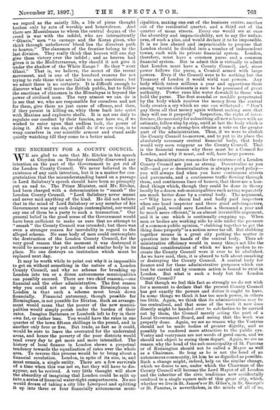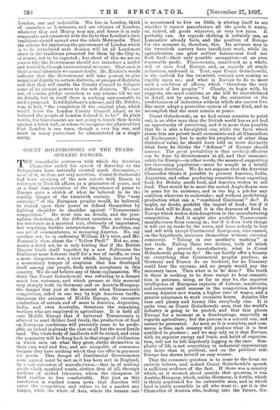THE NECESSITY FOR A COUNTY COUNCIL.
WE are glad to note that Mr. Ritchie in his speech at Croydon on Tuesday formally disavowed any intention on the part of the Government to get rid of the London County Council. We never believed in the existence of any such intention, but it is a matter for con- gratulation that the misunderstanding based on a passage in Lord Salisbury's speech should have been so promptly put an end to. The Prime Minister, said Mr. Ritchie, had been charged with a determination to " smash " the London County Council. "Lord Salisbury never meant and never said anything of the kind. He did not believe that in the mind of Lord Salisbury or any member of his Government was any such design contemplated, nor would any one of them be a party to such a transaction." Our general belief in the good sense of the Government would have been sufficient to make us sure that no attempt to " smash " the County Council was intended; but there was even a stronger reason for incredulity in regard to the alleged scheme. No sane body of men could contemplate the destruction of the London County Council, for the very good reason that the moment it was destroyed it would be necessary to put another and similar body in its place. No one destroys an institution which must be replaced next day.
It may be worth while to point out why it is impossible to get on without something in the nature of a London County Council, and why no scheme for breaking up London into ten or a dozen autonomous municipalities can possibly succeed. There are two chief reasons,—one financial and the other administrative. The first reason why you could not set up a dozen Birminghams in London is that such a scheme must break down financially. Financial autonomy, though possible for Birmingham, is not possible for Brixton. Such an arrange- ment would mean that the poorer of the new munici- palities would simply perish under the burden of their rates. Imagine Battersea or Lambeth left to fry in their own fat, or rather lean. You would have the rates in one quarter of the town fifteen shillings in the pound, and in another only four or five. But trade, as fast as it could, would be sure to leave the overrated for the underrated areas, and hence the poverty of the poor districts would tend every day to get more and more intensified. The history of local finance in London shows a perpetual tendency towards the equalisation of rates over the whole area. To reverse this process would be to bring about a financial revolution. London, in spite of its size, is, and must remain, a single entity. There are a few survivals of a time when this was not so, but they will have to dis- appear, not be revived. A very little thought will show the absurdity of imagining that London could be split up into a series of financial water-tight compartments. No one would dream of taking a city like Liverpool and splitting it up into three or four financially autonomous muni- cipalities, making one out of the business centre, another out of the residential quarter, and a third out of the quarter of mean streets. Every one would see at once the absurdity and impracticability, not to say the unfair- ness, of such a plan, and would declare it to be impossible. It is no less absurd and impracticable to propose that London should be divided into a number of independent towns, each with its private financial system. London, therefore, must have a common purse and a common financial system. But Vs admit this is virtually to admit that London must have a County Council, and, since power follows the purse, a Council armed with large powers. Even if the Council were to be nothing but the Treasury of London it would wield vast powers. Any body which raises millions a year and apportions them among various claimants is sure to be possessed of great authority. Power runs like water downhill to those who hold the purse. The first scandal or muddle perpetrated by the body which receives the money from the central body creates a cry which no one can withstand : "Don't pay them all that money again without making sure that they will use it properly." Inspection, the right of inter- ference, the necessity for submitting all new schemes with an estimate, follow step by step, until at last the body which is nominally only a strong-box obtains a veto on the greater part of the administration. Thus, if we were to abolish the County Council to-morrow, and to put in its place the absolutely necessary central financial body, that body would very soon reappear as the County Council. That is the financial reason why there must be a Council for London, and why it must, and will, have large powers.
The administrative reasons for the existence of a London County Council are just as strong. Decentralise as you will—and per se decentralisation is always a good policy— you will always find when you have continuous streets and pavements, and a continuous traffic flowing through them, and continuous lines of houses, that there are a hun- dred things which, though they could be done in theory locally by a dozen sub-municipalities each acting separately are much better done by a central body. The argument, —" Why have a dozen bad and badly paid inspectors when one head inspector and three good sub-inspectors, all well paid, would save London a thousand a year and be much more efficient," is an almost irresistible argument, and it is one which is continually cropping up. When men or bodies are working side by side under the pressure of a common public opinion, "clubbing together to get the thing done properly" is a notion never far off. But clubbing together means in a great city putting the matter in question into the hands of the central body. Thus ad- ministrative efficiency would in many things act like the financial considerations of which we have spoken to re- create the County Council were it ever to be abolished. As we have said, then, it is absurd to talk about smashing or destroying the County Council. A central body for finance and for those administrative purposes which can best be carried out by common action is bound to exist in London. But what is such a body but the London County Council? But though we feel this fact so strongly we do not wish for a moment to declare that the present County Council has got exactly the powers and duties it ought to have. In some things we think it has too much power, in others too little. Again, we think that its administration may be too centralised, and that some of the work it now does directly might be handed over to sub-bodies to be carried out by them, the Council merely acting the part of a Local Government Board, and seeing that the work was properly done. Again, we see no reason why the Vestries should not be made bodies of greater dignity, and so possibly be rendered more attractive to the public eye. Vestry and vestryman are not words of good omen, and we should not object to seeing them depart. Again, we see no reason why the head of the sub-municipality of St. Pancras or of Kensington should not be called a Mayor as well as a. Chairman. So long as he is not the head of an autonomous community, let him be as dignified as possible. Such a change might, indeed, help on the similar change, which we desire to see, under which the Chairman of the County Council will become the Lord Mayor of all London and the inheritor of the civic traditions now accidentally confined to a single square mile of this great city, which, whether we live in St. James's or St. Giles's, in St. George's or St. Pancras, is nevertheless, in the minds of all of us, London, one and indivisible. We live in London, think of ourselves as Londoners, and are citizens of London, whatever Gog and Magog may say, and hence it is only reasonable and consistent with the facts that London's civic traditions should spread over the whole Metropolis. That the scheme for improving the government of London which is to be introduced next Session will let all Londoners share in the traditions preserved for them by the City is, of course, not to be expected ; but short of this we see no reason why the Government should not introduce a useful and workable, though unsensational measure. That such is their actual intention we cannot doubt. Mr. Ritchie's words indicate that the Government will take powers to give municipal dignity to certain districts, or groups of districts, and that they will enable the County Council to delegate some of its present powers to the new districts. We can- not, of course, pledge ourselves to any scheme till we see its details, but in itself there is nothing unreasonable in such a proposal. Lord Salisbury's scheme, said Mr. Ritchie, was, in fact, "the completion of the original plan, which would leave the London County Council intact, as he believed the people of London desired it to be." In plain words, the Government are not going to knock their heads against a brick wall, or refuse to recognise the physical fact that London is one town, though a very big one, and must in many particulars be administered as a single entity.







































 Previous page
Previous page